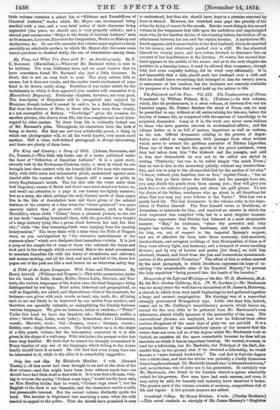The Patriarch and the Tsar. Vol. III. Tile Condemnation of
Moon.. Translated by William Palmer, M.A. (Trubner.)—In this volume, which, like its predecessors, is a stout volume, of between-five and six hundred pages, Mr. Palmer finishes the story of Nioon, not, we may be permitted to say, without at all undervaluing his labours, before the brevity of human life, as 'compared with the amount.of knowledge to be acquired, demanded. Long as it is, the work can never seem tedious to those who have genuine interest in ecclesiastical affairs ; and the volume before us is as full of matter, important as well as curious, as the rest. Official documents relating to the process of degra- dation are added as supplements, with passages from other writers which serve to correct the partisan narrative of Paisius Ligarides. From one of these we have the speech of the great patriarch, when they had taken from him "the klobouk and the panagia, and said to him that thenceforth he was not to. be called nor styled in writing 'Patriarch,' but was to be called simply 'the monk Nicon;' that he was to live in the monastery quietly, without any insubordina- tion, and was to pray to the all-merciful God for the pardon of his sins." "I know, without your homilies, how to live," replied Nicon ; " but as for this, that ye have taken the klobouk and the panagia from rue, yon may divide the pearls from them among you ; they will give you each five or six zoldnics of pearls, and about ten gold pieces. Ye are the slaves of the Sultan, wanderers who go about in all directions for alms, that you may pay your tribute to the Turks." This last was a pretty hard hit. The last documents in the volume refer to the depo- sition of Paisius himself. The Tsar himself wrote to Dosithens, of Jerusalem, to intercede for him, and received an answer in which the wish expressed was complied with, but in a most singular manner. Dositheus represents that Paisius had behaved in a most abominable manner. "But," he continues, "since thy powerful and holy empire has written to us, thy beadsman, and hath made request for him, we, out of respect to thy imperial Majesty's request, and not of affection for thee, take those unseemly, foul-mouthed, insubordinate, and arrogant revilings of that Metropolitan of Gaza as if they were silvery light, and harmony, and a bouquet of sweet-smelling flowers; and by way of honour and praise [for them], we hold him absolved, blessed, and freed from the just and tremendous excommunie cations of the patriarch Nectarine." The effect of this is rather marred by the next paragraph, in which Dositheus expresses his hope of re- ceiving "the unspeakable alms of his Imperial Majesty," to prevent the holy sepulchre "being pawned into the hands of the heretics."


































 Previous page
Previous page